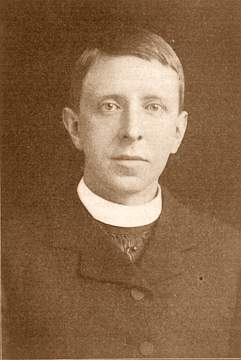
Some Visitors


|
Robert Hugh BensonRobert Hugh Benson, son of the Archbishop of Canterbury, became a Roman Catholic priest, a novelist, and a prominent writer of apologetics. He published Confessions of a Convert and Lourdes serially in Notre Dame's magazine, The Ave Maria, before he brought them out as books. He visited Notre Dame in April of 1914, seven months before he died at the age of forty-three. |
[A report of his lecture at the University of Notre Dame from the Notre Dame Scholastic 47:25 (25 April 1914) pp. 614-615.]
But a few times in the course of the entire year are Faculty and students afforded the opportunity of attending such a splendid lecture as was delivered by Monsignor Robert Hugh Benson, the celebrated English novelist and lecturer, in Washington hall Saturday evening. Preceded by a world-wide reputation as writer and Catholic apologist, Monsignor Benson appeared here before an audience keenly expectant as well as acutely critical. To realize the liberal appraisal of anticipation is to register the highest in possible attainment, and Father Benson certainly achieved that goal when he won the enthusiastic applause of many who had measured their critical standards in accordance with his excellent novels. It had been rumored about the campus that the distinguished English visitor would make "Spiritism" the theme of his discourse, and this impression prevailed until he had appeared upon the stage. After Father Cavanaugh's felicitously phrased introduction, however, Mgr. Benson announced that he had elected to discuss the Papacy.
Father Benson's address was remarkable for the same facility of expression, cogency of reasoning, and forcefulness of phrasing, that have so characterized his novels and essays. He treated the question of Papal authority and infallibility from the viewpoint of a convert. By apt illustration, he demonstrated the necessity of some central and supreme authority. By citing the opinions of clergymen of various demoninations upon religious questions, he proved that nowhere outside the Catholic Church is there any unanimity of opinion, unity of authority or concerted endeavor. He emphasized the significant incongruity of having any matter of faith or belief interpreted a score of ways by as many different creeds. He stressed the absurdity of a hundred sects, each proclaiming itself the true Church of God. He demonstrated with clinching logic the fact that one, and only one, must of necessity be right, and the others accordingly wrong. In the matter of the authority of the Pope, he cited Scriptural authority to prove his point, overthrowing in half a dozen sentences the absurd argument that the Greek words do not permit of the Catholic interpretation of papal authority -- Christ did not speak in Greek. Monsignor Benson made out an impregnable case for Papal jurisdiction, citing and refuting the most plausible arguments of all ages against the real supremacy of Christ's Vicar at Rome. He is a pleasing and powerful speaker, his reasoning being flawless and his presentation of fact lucid and unmistakable. He held the undivided attention of his audience throughout, sustaining interest rather by the charm of a magnetic personality and a virile argument than by rhetorical artifice or forensic sensationalism. Notre Dame is signally honored by having been included in the itinerary of this brilliant novelist, lecturer and essayist, in his visit to the United States.